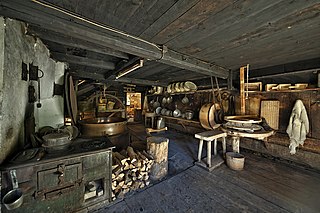
A dairy is a place where milk is stored and where butter, cheese and other dairy products are made, or a place where those products are sold. It may be a room, a building or a larger establishment. In the United States, the word may also describe a dairy farm or the part of a mixed farm dedicated to milk for human consumption, whether from cows, buffaloes, goats, sheep, horses or camels.

Lincoln County is a county located in the south central part of the U.S. state of Tennessee. As of the 2020 census, the population was 35,319. Its county seat and largest city is Fayetteville. The county is named for Major General Benjamin Lincoln, an officer in the American Revolutionary War.

Fayetteville is the second-most populous city in Arkansas, the county seat of Washington County, and the most populous city in Northwest Arkansas. The city is on the outskirts of the Boston Mountains, deep within the Ozarks. Known as Washington until 1829, the city was named after Fayetteville, Tennessee, from which many of the settlers had come. It was incorporated on November 3, 1836, and was rechartered in 1867. Fayetteville is included in the three-county Northwest Arkansas Metropolitan Statistical Area, which is ranked 100th in terms of population in the United States with 576,403 in 2022 according to the United States Census Bureau. The city had a population of 99,285 in 2022.
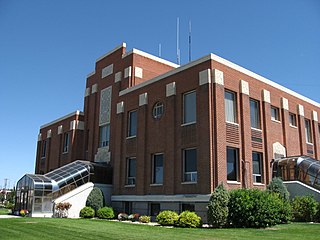
Burley is a city in Cassia and Minidoka counties in southern Idaho, United States. The population was 11,704 at the 2020 census, up from 10,345 in 2010. The city is the county seat of Cassia County.
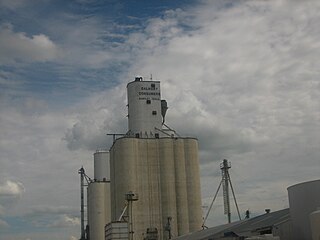
Dalhart is a city in Dallam and Hartley counties in the U.S. state of Texas, and the county seat of Dallam County. The population was 7,930 at the 2010 census.

The Tillamook County Creamery Association (TCCA) is a farmer-owned dairy cooperative headquartered in Tillamook County, Oregon, United States. The association manufactures and sells dairy products under the "Tillamook" brand name. Its main facility is the Tillamook Creamery, located two miles north of the city of Tillamook on U.S. Route 101.

Condensed milk is cow's milk from which water has been removed. It is most often found with sugar added, in the form of sweetened condensed milk (SCM), to the extent that the terms "condensed milk" and "sweetened condensed milk" are often used interchangeably today. Sweetened condensed milk is a very thick, sweet product, which when canned can last for years without refrigeration if not opened. The product is used in numerous dessert dishes in many countries.
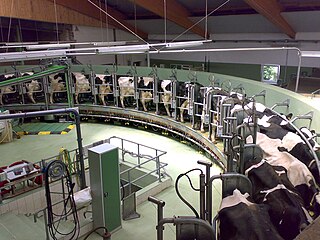
Dairy farming is a class of agriculture for long-term production of milk, which is processed for eventual sale of a dairy product. Dairy farming has a history that goes back to the early Neolithic era, around the seventh millennium BC, in many regions of Europe and Africa. Before the 20th century, milking was done by hand on small farms. Beginning in the early 20th century, milking was done in large scale dairy farms with innovations including rotary parlors, the milking pipeline, and automatic milking systems that were commercially developed in the early 1990s.

Gail Borden Jr. was a native New Yorker who settled in Texas in 1829, where he worked as a land surveyor, newspaper publisher, and inventor. He created a process in 1853 to make sweetened condensed milk. Earlier, Borden helped plan the cities of Houston and Galveston in 1836.

Lincoln Boyhood National Memorial is a United States presidential memorial and a National Historic Landmark District in Lincoln City, Indiana. It preserves the farm site where Abraham Lincoln lived with his family from 1816 to 1830. During that time, he grew from a 7-year-old boy to a 21-year-old man. His mother, Nancy Hanks Lincoln, and at least 27 other settlers were buried here in the Pioneer Cemetery. His sister Sarah Lincoln Grigsby was buried in the nearby Little Pigeon Baptist Church cemetery, across the street at Lincoln State Park.

Borden Dairy Company is an American dairy processor and distributor headquartered in Dallas, Texas. Established in 2009, the company is a successor to the original Borden Company established in 1857 by Gail Borden. The company is a former subsidiary of Dean Foods.

Dean Foods was an American food and beverage company and the largest dairy company in the United States. The company's products included milk, ice cream, dairy products, cheese, juice, and teas. It processed milk in the United States under a number of regional and national brands. Headquartered in Dallas, Texas, it maintained plants and distributors in the United States. Dean Foods had 66 manufacturing facilities in 32 U.S. states and distributed its products across all 50. Through acquisition and licensing, Dean produced dairy products under many well-known national and regional brand names such as: DairyPure, TruMoo, Friendly's, Mayfield, Dean's, Meadow Gold, Purity, Tuscan, T.G.Lee and Alta Dena.

A non-dairy creamer, commonly also called tea whitener or coffee whitener or else just creamer, is a liquid or granular product intended to substitute for milk or cream as an additive to coffee, tea, hot chocolate or other beverages. They do not contain lactose and therefore are commonly described as being non-dairy products, although many contain casein, a milk-derived protein.

Borden, Inc., was an American producer of food and beverage products, consumer products, and industrial products. At one time, the company was the largest U.S. producer of dairy and pasta products. Its food division, Borden Foods, was based in Columbus, Ohio, and focused primarily on pasta and pasta sauces, bakery products, snacks, processed cheese, jams and jellies, and ice cream. It was best known for its Borden Ice Cream, Meadow Gold milk, Creamette pasta, and Borden Condensed Milk brands. Its consumer products and industrial segment marketed wallpaper, adhesives, plastics and resins. By 1993, sales of food products accounted for 67 percent of its revenue. It was also known for its Elmer's and Krazy Glue brands.

The National Dairy Shrine is an American dairying group founded in 1949 and based in Wisconsin. The shrine promotes the dairy industry and records its history. As of 2007, the organization had over 18,000 members from most facets of dairying. It holds an annual ceremony where it inducts members of the dairy industry into its hall of fame.

Universal Laboratories Building is a building in Dassel, Minnesota, United States, listed on the National Register of Historic Places. It was listed on the National Register for its role in the production of ergot from the mid-1930s through the late 1960s.

The Newens Sanitary Dairy Historic District is located in Des Moines, Iowa, United States. It consists of three buildings, the former dairy buildings and the Newens’ family home. The district has been listed on the National Register of Historic Places since 2003.
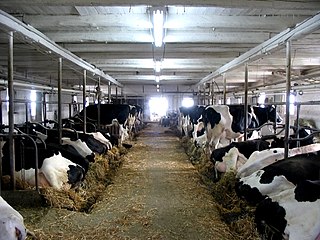
Canada's supply management, abbreviated SM, is a national agricultural policy framework used across the country, which controls the supply of dairy, poultry and eggs through production and import controls and pricing mechanisms. The supply management system was authorized by the 1972 Farm Products Agencies Act, which established the two national agencies that oversee the system. The Agriculture and Agri-Food Canada federal department is responsible for both the Canadian Dairy Commission and its analogue for eggs, chicken and turkey products, the Farm Products Council of Canada. Five national supply management organizations, the SM-5 Organizations — Egg Farmers of Canada (EFC), Turkey Farmers of Canada (TFC), Chicken Farmers of Canada (CFC), the Canadian Hatching Egg Producers (CHEP) and the Ottawa-based Canadian Dairy Commission (CDC), a Crown corporation — in collaboration with provincial and national governing agencies, organizations and committees, administer the supply management system.
The Sego Milk Plant, also known as the Utah Condensed Milk Company Plant, was a historic factory located in Galt, Sacramento County, CA.
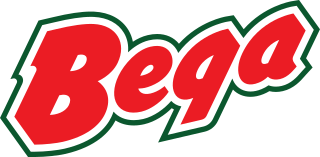
The Bega Group is an Australian diversified food and drinks company with manufacturing sites in New South Wales, Queensland, Western Australia and Victoria. Founded as an agricultural cooperative in the town of Bega, New South Wales by their dairy suppliers, it became a public company in 2011 when it listed on the Australian Securities Exchange. Close to half of shares publicly traded are still held by Bega's farmer-suppliers. It is currently one of the largest companies in the dairy sector in Australia, with a base milk supply in 2018 of approximately 750 million litres per annum.





















